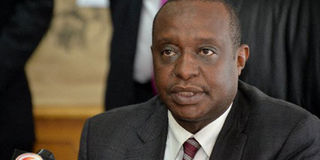Treasury to reject pleas for non-essential funding from State offices

National Treasury Cabinet Secretary Henry Rotich speaks during the handover of the Energy and Petroleum Ministry to the new Cabinet Secretary Charles Keter at Nyayo House, Nairobi, on December 22, 2015. He has said Treasury will continue to be guided by an austerity streak initiated last year as the country faces mounting financial obligations this year. PHOTO | SALATON NJAU | NATION MEDIA GROUP
What you need to know:
- Cabinet Secretary Henry Rotich said the government is finalising a review of proposals and revised estimates for additional funding by ministries and departments.
- According to the 2015 Budget Review and Outlook Paper, the Ministry expects to borrow at least Sh542 billion representing 7.4 per cent of the GDP in the financial year 2016/17 to plug gaps in the national budget.
The National Treasury says it will chop off unnecessary expenditure requests from State offices.
Cabinet Secretary Henry Rotich said the government is finalising a review of proposals and revised estimates for additional funding by ministries and departments.
These will then be presented to the National Assembly for approval through a supplementary budget when the House resumes.
He said the allocations in the extra budget would be guided by prudence as Treasury continues to attempt to save on finances by cutting back on non-essential expenditure.
“We are starting to review them (supplementary budget proposals) from Monday, (January 11) even though the deadline of submission for (the revised estimates) was today (January 8). We will review all the proposals in the course of the next one or two weeks so that we can submit them on time when Parliament resumes,” Mr Rotich told the Nation on phone.
He said Treasury will continue to be guided by an austerity streak initiated last year as the country faces mounting financial obligations this year.
“We will continue to eliminate those projects or products that are not very productive or necessary. That is one of the criteria for accessing the budget. There are specific areas we have told people to cut on including consumables and things to do with travel. The usual culprits of austerity are there,” said the Cabinet secretary.
MORE BORROWING
He, however, said an exact figure in savings made from the austerity measures so far had not yet been arrived at.
“We will arrive at a figure (of savings made) when the assessment comes on Monday. We hope to see what we will save. Ultimately the view is to reduce borrowing…we are looking at ways in which we can bring borrowing down,” said Mr Rotich.
Experts say Treasury must do more in balancing the need for executing its money hungry fiscal programmes based on the prevailing tight conditions.
According to the 2015 Budget Review and Outlook Paper, outlining government fiscal plans for the next financial year, the National Treasury expects to borrow at least Sh542 billion representing 7.4 per cent of the GDP in the financial year 2016/17 to plug gaps in the national budget.
Treasury estimates it requires Sh5.8 billion to fund several mega projects, which are ongoing or set to start this year.
They include the Sh2.1 trillion standard gauge railway whose first phase is 65 per cent complete, the 10,000 kilometres road project and the Sh400 billion one-million-acre Galana-Kulalu Irrigation Scheme among others.





